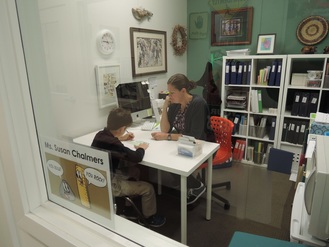
So, what does all of that look like at our school? Everyone who comes to visit us sees visual supports everywhere. There are visual schedules (with written and pictorial representation) and colour-coded student timetables; there is clear signage; there are visual reminders of routines and processes; there are SmartBoards in every room; and graphics about learning and self-regulation; and even playground etiquette to be found throughout the school. For students with working memory issues; or reading challenges; or auditory processing concerns, visual supports are an essential element in making them successful.
When you walk into any one of our classrooms, at first glance it looks pretty typical, but then upon closer inspection, you notice wiggle cushions, hokki stools and sit balls. There are thera-bands and tennis balls on chair legs and desk and table height is varied from sit on the floor to standing and everything in between. These are environmental supports and often include other variations such as varied types of seating (couches, chairs and cushions); a lack of clutter and extraneous noise or distracting displays. There are built-in social supports such as SEL classes three times each week; zones of regulation bulletin board reminders; our Social Emotional Development Centre which is staffed and always open for students to self-refer, or to provide a destination when a teacher notices that a child needs a break. We have a team of counsellors, an SLP and a psychologist always available to provide individual support as well as social groups and facilitated play groups running every day at lunch. In addition, at KGMS/Maplewood every student benefits from assistive technology (personal laptops or Chromebooks; and iPads) with supportive software and each classroom is equipped with an FM and soundfield system. These communication supports ensure that learning is accessible for all students and using apps like Read and Write for Google supports students who need speech to text or text to speech capabilities; helps with word recognition and definition; and even provides useful research tools for senior students and staff. In other words, universal support!
Programming and assessment supports are basically our stock-in-trade but a critically important part of that is the provision of daily one on one tutoring for everyone in the school. Timetables are designed so that every class has a block set aside each day for tutoring. Every student goes to her or his assigned tutor and, when the door closes, they receive individualized intervention to meet their personal needs. Tutoring is a perfect example of universal design - everyone is treated the same (they all go to tutoring at the same time), but everyone gets something different (their own personalized programme). What is necessary for some, is beneficial for all!
Finally, like most schools, we are ramped and accessible; we have trained first aid staff and medical personnel who are linked to our building; and we provide necessary supports for students with more severe medical conditions and physical challenges. Making sure that we have access to the necessary trained personnel for certain students, enhances our ability to meet the needs of all of our kids should an emergency arise.
At KGMS/Maplewood, we know that everyone learns differently and we believe that every child deserves to learn in a UDL school environment where they can maximize their potential and where being "different" is accepted as "normal". This is not "special" education, it is just "effective" educational practice.


 RSS Feed
RSS Feed
